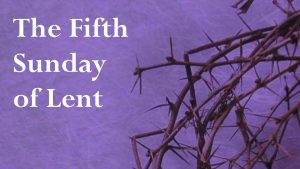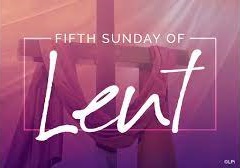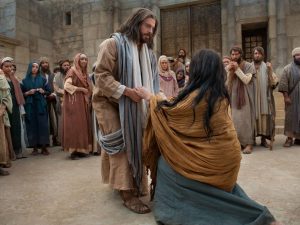 Last Sunday we heard the parable of the Prodigal Son from the Gospel of Luke. Our selection here from the Gospel of John offers another lesson about God’s mercy and forgiveness – not a parable but a report of a personal encounter between Jesus, some scribes and Pharisees, and a woman. In this case, Jesus’ response to those who accuse the woman of adultery is a lesson in profound mercy and forgiveness. It is a forceful reminder that we too have been saved by Jesus’ compassion.
Last Sunday we heard the parable of the Prodigal Son from the Gospel of Luke. Our selection here from the Gospel of John offers another lesson about God’s mercy and forgiveness – not a parable but a report of a personal encounter between Jesus, some scribes and Pharisees, and a woman. In this case, Jesus’ response to those who accuse the woman of adultery is a lesson in profound mercy and forgiveness. It is a forceful reminder that we too have been saved by Jesus’ compassion.
The Gospel account says these people brought this woman to Jesus to trap him. You see, Jesus had forgiven some people of their sins, like the man born blind and the crippled man. But the sins that those people had been accused of were not considered crimes. Here was a woman accused of a major crime. Had a trial already taken place and a verdict of GUILTY already upon her head? Would Jesus fulfill the law? Or would he do what he’d done before: forgive her? She is counting on the compassion of this man of God.
Thinking about that crowd. It may be pretty easy to spot a Pharisee, and we might not like to admit it, but we can all behave like a Pharisee. How will you know if you’re a Pharisee?
- If your official title is longer than your given name.
- If you’re willing to be merciful – once. You’re getting you final chance
- If God’s still small voice… sounds exactly like your own.
- If you know the Word of God, but not the God of the Word.
What does Jesus do? He stoops down and writes in the dirt. What’s he writing? Was he just doodling or was he writing something meaningful? The Gospel does not say. What John tells us is Jesus’ last words to the woman, “Go away and don’t sin anymore.” He does not say to her, or to us, “Leave your life of sin, then I will no longer condemn you.” He does say this: “I do not condemn you; now leave behind your life of sin.” He did not simply ignore sin or overlook it. Jesus chose not to condemn the woman, but He did not tell her that her sin was unimportant.
Maybe this little story, a true one I’m told, reminds you of someone you know most intimately. Like, you know, yourself? I’m told that a 4-year-old said to his mother, “Mom, I decided I’m not going to sin any more. I’m not going to be like those bad guys Jesus was talking to. I’m going to be a good child of God.” “Mmm, that’s very nice,” Mom answered. “What made you decide that?” “ ‘Cause Jesus said if you don’t sin, you can throw the first stone. I want to throw the first stone at the bad person.”
Maybe you never thought that way. But you may have noticed that when you point your finger at “her,” there are three fingers on your hand pointing right back at you. Self-examination opens us to self-revelation. And, Jesus reminds us: “Judge not, lest you be judged.”
Notice in today’s second reading Paul says: “it is not that I have already attained perfect maturity, but I continue my pursuit in hope that I may possess it.” Let us pray that same gift for each other. May I be mindful of Jesus’ way of not looking at the past. Instead, he says: “Neither do I condemn you. Go, and from now on do not sin anymore.” Today, I promise you, Jesus, with Your help, I will not hold anyone’s past against them. May God strength me/us in my/our resolve.
~Reflection by Sister Roberta Bailey, OSB





